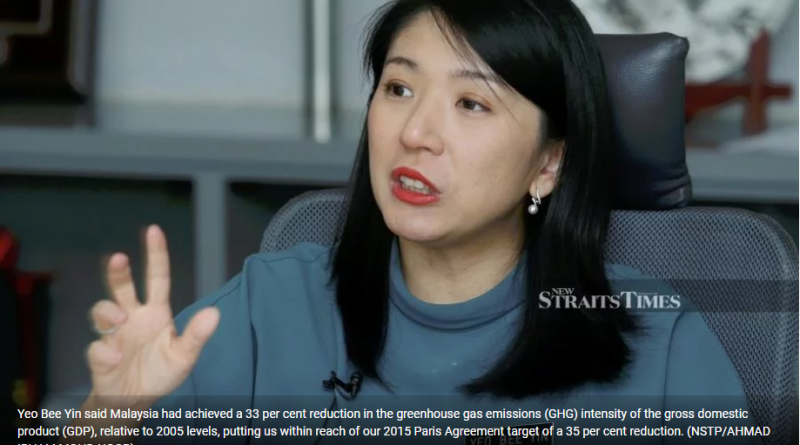Reduce total emissions, not just emissions intensity of GDP
EARLIER this month, Energy, Science, Technology, Environment and Climate Change Minister Yeo Bee Yin announced that Malaysia would review its emissions reduction targets at the next United Nations climate change conference in Glasgow next year.
Yeo said Malaysia had achieved a 33 per cent reduction in the greenhouse gas emissions (GHG) intensity of the gross domestic product (GDP), relative to 2005 levels, putting us within reach of our 2015 Paris Agreement target of a 35 per cent reduction.
All our future targets should be completely decoupled from GDP as what matters most are absolute emissions reduction.
The root cause of climate change is the increasing concentration of GHGs in the atmosphere.
These heat-trapping gases are the prime cause of the steady rise in average surface temperatures and rising temperatures are linked to many of the changes in the Earth’s climate that are projected by scientists to cause severe economic damage both today and well into the future.
One of the ways to solve this issue is by removing GHGs from the atmosphere through geo-engineering.
Cutting current and future GHG emissions significantly will avert uncontrollable rises in surface temperatures on Earth, which will bring about further damage on almost unfathomable scales.
There is an important need to focus more on total emissions reductions and not just on reducing the emission intensity of GDP.
As long as economic growth outstrips the growth of emissions, Malaysia will easily hit targets that do not address the increasing concentration of GHGs in the atmosphere.
With this in mind, it is hoped that Yeo will decouple Malaysia’s emissions reduction goals from the GDP when improving on our pledges in Glasgow next year.
Instead, Malaysia should set a total absolute emissions reduction target, as well as set a date for the peaking of total emissions sometime within the next decade.
In order for this to happen, we need to aggressively deploy clean energy technologies across the country in the coming years, and improve our public transport infrastructure.
The ministry must also seriously consider the implementation of a tax on GHG emissions.
This fundamental measure can strengthen the economic cases for low-carbon technologies across every sector it covers.
In doing so, Malaysia would follow the example of more than 70 jurisdictions globally that have either implemented or have imminent plans to implement carbon pricing schemes and have a purely market-based measure assisting in the achievement of emissions reduction goals.
Source: NST



